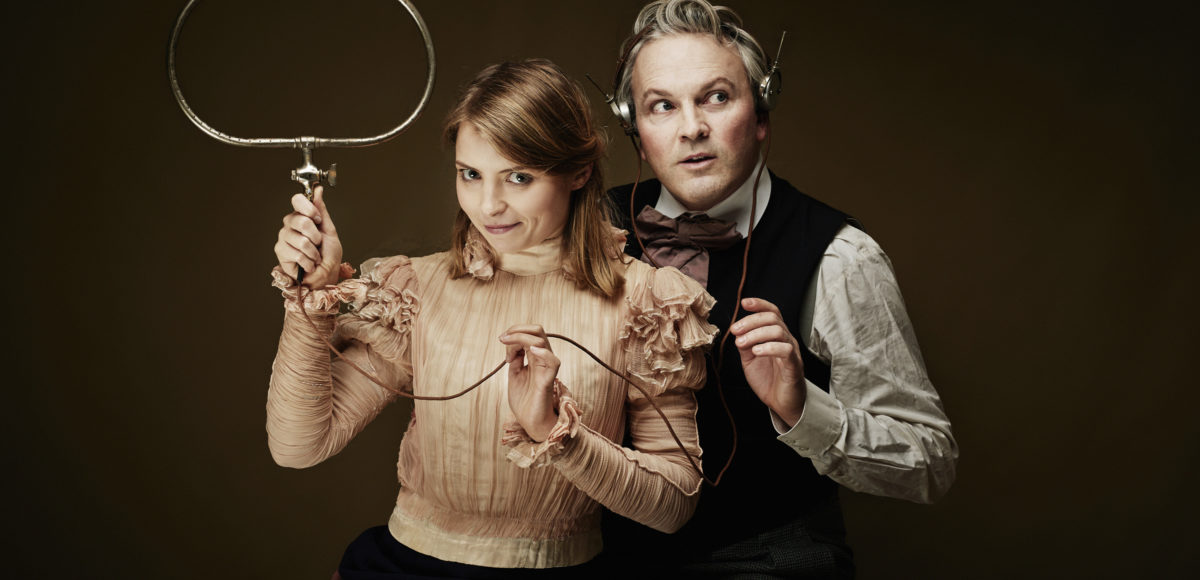Borders may be clanging shut around the world, but the Ottawa Children’s Festival is still dusting off the welcome mat.
The 34th annual edition of the festival, which has an admirable track record for presenting work that is thoughtful, well-produced and just plain fun, runs May 8-12 in LeBreton Flats Park.
Six of this year’s seven shows feature international companies, notes the festival’s artistic producer Catherine O’Grady. “With the closing down of borders, we tried to say, ‘We welcome the world.’ The world is a beautiful place, and artists are at the forefront of this. I want to say, ‘The doors are open.’”
They are open despite on-going money problems. O’Grady says financial challenges, including rental costs at LeBreton Flats, have been significant the last couple of years, and organizers work hard to keep tickets ($13) affordable for families.
But those problems pale in comparison to the rewards of keeping the doors open, according to O’Grady. Her favourite thing about the festival is seeing the children’s excitement. “They jump up and down and clap their hands and can’t wait to get into the theatre. It’s the sense of anticipation in their eyes, knowing that they’re not going to be disappointed and then coming away knowing something wonderful has happened.”
They Called Her Vivaldi is one of the shows youngsters will be coming away from this year. The production by Theatre Lovett (Dublin, Ireland) is about a girl named Cecilia Maria, called Vivaldi for her musical gifts, and her father, Edward M. Haberdasher. Edward makes a wondrous hat for his daughter, a hat that offers her comfort in a cacophonous world and helps her compose songs. The show is suitable for children seven and older.
Muireann Ahern, the show’s director and the company’s co-artistic director, describes Theatre Lovett as “old school theatrical,” one that leans on stage craft rather than using technology like digital screens.
“We like to have heightened moments of theatricality balancing with absolute stillness and neutrality,” she adds. “(Too) often, young audiences can be bombarded with bright colours, flashing lights. They Called Her Vivaldi plays with tempos, moments of pathos and moments of chaos.”

Andy Cannon in Is This A Dagger? The Story of Macbeth. Photo: Sandy Butler
Her co-artistic director Louis Lovett, who plays Edward in the show, recommends that parents go easy if they’d like their children to talk about this or any show after seeing it. His suggestion: instead of asking, “How did you like it?” – which often prompts a shrug and “I dunno” – say nothing and wait for your youngster to bring up the show. Or try humming a tune from it and see what happens. “Might work. Might not,” he says. “Don’t beat yourself up. If the piece of theatre was good to begin with, then trust me: your child’s brain is swimming in a sea of happy amazement. Let them swim.”
Andy Cannon is offering young audiences a chance to swim in a different sea. The Scottish performer is bringing Is This a Dagger? The Story of Macbeth to the festival. His adaptation, suitable for children eight and older, includes a quick summary of the original story which Shakespeare both borrowed from and liberally changed.
He believes it’s “one of the greatest cautionary tales ever told” but that now, as in Shakespeare’s time (and the historical King Macbeth’s lifetime 500 years previously), “there are still many leaders and politicians who will pursue power at any cost, and to hell with the consequences! It felt important to share with young people that we must be vigilant to this pernicious human trait.”
Like the folks at Theatre Lovett, Cannon gets a kick out of post-show Q&As with youngsters. He’s had every question imaginable, including “Do you have WiFi in Scotland?”
Along with enjoying a good story well told, he hopes that his young audiences “see that theatre can be created simply with just a handful of props and doesn’t have to require large sets, costumes, lights and so on, nice as those things are.”
The rest of the festival program:
Les Parfaits Inconnus, Quebec. A rock ‘n’ roll performance for all ages featuring comedy, acrobatics and juggling.
A Mano, Spain. A story about love, friendship and sympathy told with just fingers and clay. Ages six and up.
Paper Planet, Australia. Assisted by artists, children of all ages populate this installation with their own paper creations.

A scene from Fly by Denmark’s Teater Patrasket. Photo: Sõren Meisner
Fly, Denmark. Max, a poor orphan boy, longs to fly, and one day he meets Lily, the giraffe woman. Love may be the same as flight. Ages five and up.
Kaschtanka, Germany. A lost dog joins a circus and discovers music, zany characters and great tricks. Adapted from the short story of the same name by Anton Chekhov. Ages seven and up.
Other on-site activities include the Cirque du Soleil Alegria fun zone with an arts workshop, face painting, Little Ray’s Reptiles, a finger puppet workshop, and more.
The Ottawa Children’s Festival runs May 8-12 at LeBreton Flats Park. Information and tickets: 613-241-0999, ottawachildrensfestival.ca







